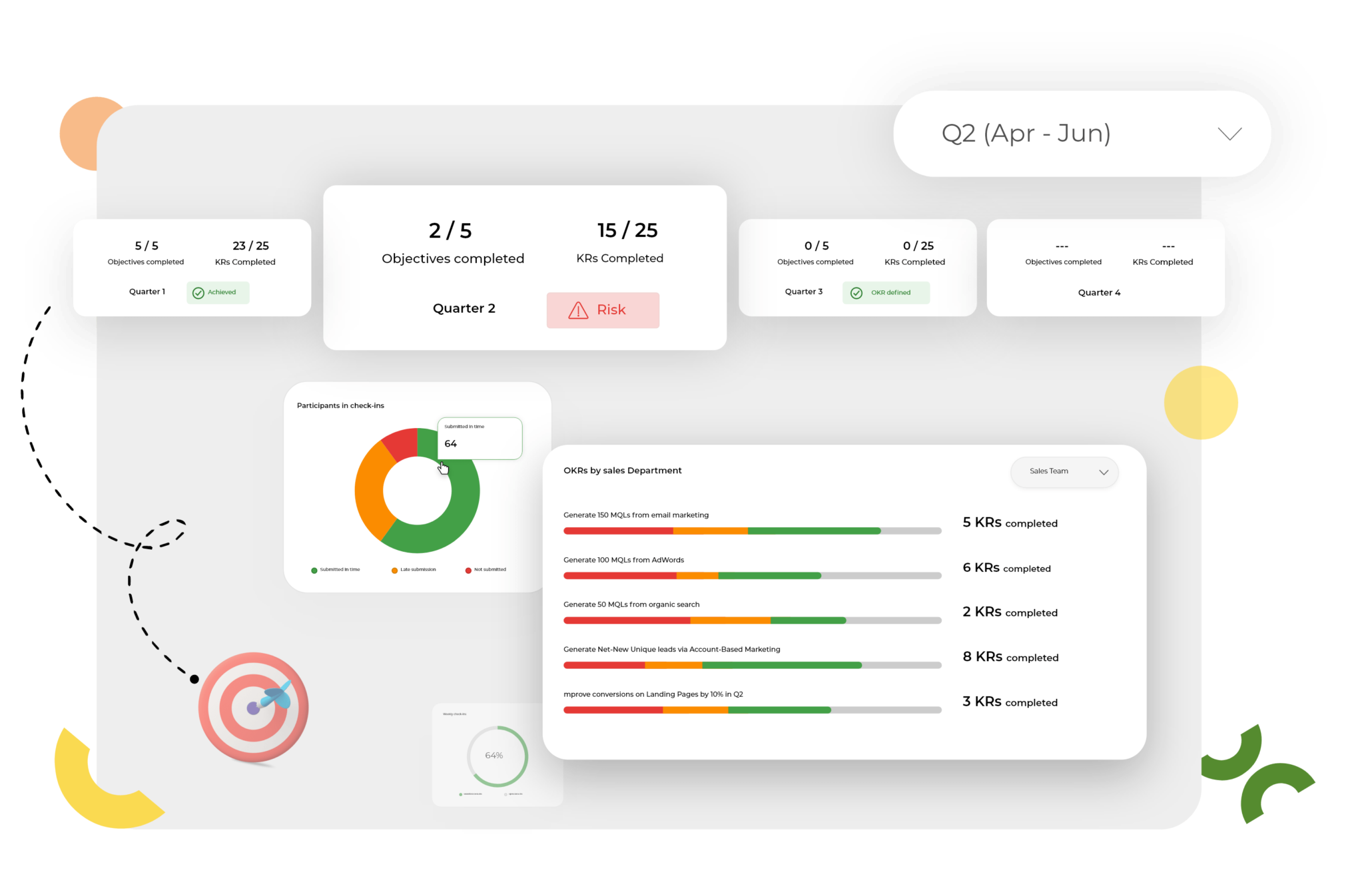Do you find it challenging to align your team’s goals with the company’s overall objectives? Look no further! Objectives and Key Results (OKRs) can help you focus on the right metrics, enhance transparency, and improve collaboration. Here, we’ll explore how OKRs work, their benefits, and some practical tips on setting them up for success. So, buckle up and get ready to transform your approach to performance management!
Benefits of Using OKRs
There are many benefits to using OKRs. They can help you keep track of your progress, set priorities, and identify what is most important to your organization. Additionally, OKRs can help improve communication and collaboration within your team. OKRs can help you track your performance over time and ensure that you are meeting your goals.
Setting Up Effective OKRs
To set up effective OKRs, there are a few key steps that you should follow:
- Define your company’s overall mission and objectives.
- Draft measurable goals and objectives that support the company’s mission and contribute to its success.
- Create a timeline for each goal and objective, ensuring that they are realistic and achievable.
- Assign responsibility for each objective and goal to specific individuals or teams.
- Set up a system for tracking progress towards each goal and objective, so that you can gauge whether they are being met effectively.
Periodically review and adjust your goals and objectives as needed, in response to changes in the business environment or your company’s strategy.
How to Measure the Success of Your OKRs?
When it comes to measuring the success of your OKRs, there are a few key things you need to keep in mind. First, you need to make sure that you’re tracking the right metrics. This means focusing on the key indicators that will show whether you’re achieving your objectives. Then, you need to set realistic goals.
If your goals are too ambitious, it will be difficult to accurately measure progress. You need to be uniform in your readings. This means tracking your progress on a regular basis and adjusting as necessary. By following these tips, you can ensure that you’re properly measuring the success of your OKRs.
Tips and Tactics for Achieving Your Goals with OKRs
Goals are the first step, but they need to be specific, measurable, achievable, relevant and time-bound (SMART) in order to be effective. Without these characteristics, it can be difficult to assess whether you’re making progress. Once you have your goals set, it’s important to develop a plan for how you’ll achieve them. This is where OKRs come in. OKRs provide a framework for setting measurable goals and tracking progress over time. Here are a few tips and tactics for using OKRs to achieve your goals:
- Define your objectives carefully. What do you need to achieve? What are your key results? Be as specific as possible.
- Set realistic goals. It’s important to set achievable objectives that you can actually complete within the timeframe you’ve set.
- Assure that your objectives are aligned with your organization’s objectives. Your goals should support the overall mission and vision of your organization.
- Communicate your objectives throughout the company. Everyone should be aware of the company’s objectives and know how their work contributes to achieving those objectives.
- Track progress regularly. Set up a system for tracking progress against each objective and key result on a regular basis. This will help you identify areas where you’re making progress and areas where more focus is needed
Common Mistakes to Avoid When Using OKRs
There are a few common traps that companies fall into when implementing OKRs. Here are a few to avoid:
- Don’t make your objectives too small or easy to achieve. They should be challenging yet achievable.
- Don’t make your key results too narrowly focused. They should be broad enough to capture the various activities that contribute to the objective.
- Don’t set an unrealistic timeframe for key results. Remember, these are supposed to be ambitious yet achievable goals, so don’t set yourself up for failure by setting an impossible deadline.
- Don’t forget to review and revise your OKRs on a regular basis. They should evolve as your company’s priorities change and as you learn what works and what doesn’t.
Conclusion
OKRs, are the perfect tool for helping you stay focused on the right metrics and executing your business goals. With the ability to set ambitious targets that demand excellence from all teams involved in projects, OKRs will help ensure that everyone is pushing towards success. By making sure you track progress through each step of completion and have a plan in place to measure results accurately, OKRs can provide a great focus for your entire team!
To know more about us Visit our 10xwinners OKR Software, Follow our social media for instant updates!
Contents




 for growth seeking organizations.
for growth seeking organizations.
Comments are closed